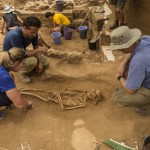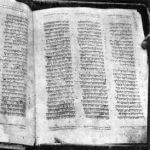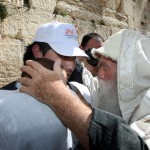“Jerusalem is built like a city that is closely compacted together. That is where the tribes go up—the tribes of the Lord—to praise the name of the Lord according to the statute given to Israel.” (Psalm 122:3–4)
Australia took a courageous stand last week against the international trend to label East Jerusalem “occupied.”
“The description of East Jerusalem as ‘occupied’ East Jerusalem is a term freighted with pejorative implications which is neither appropriate nor useful,” Attorney General George Brandis told Australia’s senate on Thursday, reading from a carefully drafted statement that was written following a conversation with Australian Foreign Minister Julie Bishop.
“It should not and will not be the practice of the Australian government to describe areas of negotiation in such judgmental language,” he added.
The statement clarified Australia’s position with regard to the Israeli-Palestinian “dispute” stating that the country “recognizes the right of Israel to exist peacefully within secure borders and also recognizes the aspiration to statehood of the Palestinian people.” (HaAretz)
At a time when increasing numbers of European states are backing every move of the Palestinian government, Australia’s courageous policy shift is refreshing and welcome in Israel.
Jerusalem was divided for a very brief period of time when Jordan captured it, along with Judea and Samaria (West Bank), in a response to Israel declaring itself a nation in 1948.
Israel reunified Jerusalem in 1967 during the Six Day War after the surrounding Arab nations amassed their superior military might against Israel once again.
Even though Israel won the war and reclaimed their capital city, most of the international community does not recognize Israel’s right to govern East Jerusalem and, instead, claims that Israel is occupying a territory not legally theirs.
Although Jordan no longer lays any claim to the West Bank area it occupied after the 1948 war, the Palestinians demand that this land be set aside for a Palestinian state.

The portions of Israel that Jordan occupied (including the Old City of Jerusalem, home to Judaism’s holiest site, the Temple Mount) were cut off from the Jewish People. Today, Palestinians call the 1949 armistice line between Israel and Jordan (the Green Line) the 1967 borders. They demand that a two-state solution be created by re-instituting this unworkable division, once again cutting off the Jewish People from their ancient heartland and the Temple Mount.
The Palestinian Authority condemned Australia’s announcement, which came as Palestinians were marking Naksa Day, a mourning of Israel’s reunification of Jerusalem in 1967.
In a letter to Bishop, Palestinian Chief Negotiator Saeb Erekat stated, “This pattern of behavior also places Australia badly out of step with the international consensus that the 1967 border must be reinforced as the basis for negotiations towards a two-state solution.”
Brandis said that the term “occupied” was unhelpful since that kind of language prejudges a situation that is still subject to negotiation. It says that Israel is not supposed to be in the West Bank in any capacity, which is not yet proven. So he favors the term “disputed territories,” which more accurately describes the situation.
PLO Executive Committee member and veteran politician Hanan Ashrawi said Thursday evening that he believes the issue is already settled: “It is absolutely disgraceful and shocking that on the 47th anniversary of Israel’s military occupation of the West Bank (including East Jerusalem), and Gaza, Australian Attorney-General George Brandis is issuing such inflammatory and irresponsible statements.… Such pronouncements are not only in blatant violation of international law and global consensus, but are also lethal in any pursuit of peace and toxic to any attempt at enacting a global rule of law.” (Times of Israel)

In November, Australia’s leaders registered their opposition to a UN resolution that ordered an end to “all Israeli settlement activities in all of the occupied territories.” In the above photo are Australian Attorney-General George Brandis (left); Australian Prime Minister Tony Abbot (center); Australian Foreign Minister Julie Bishop (right). (YouTube capture)
Brandis’ announcement followed a heated debate Wednesday evening in the Australian Senate, in which Senator Lee Rhiannon repeated references to “occupied east Jerusalem.”
“The tendentious description that Senator Rhiannon is using … is not the descriptor that the government uses. I don’t profess view on this matter. I’m merely correcting the use of a term … by Senator Rhiannon which prejudges the issue about which she inquires,” Brandis corrected.
Even in his January visit to Israel to attend the funeral of Ariel Sharon, Brandis refused to refer to the settlements as “illegal” nor to Judea and Samaria as “occupied” territories. (JPost)
This clarified policy position was met with criticism by several Australian senators who noted that it has been a long-standing bipartisan policy of both right and left governments to define East Jerusalem as occupied.
One legislator, Senator Nick Xenophon, told the local media, “It is contrary to the government’s position; it is completely unhelpful to walk away from the term ‘occupied.’”
Israel’s foreign minister, Avigdor Liberman, praised Brandis’ position saying it demonstrated a “serious” approach to the issues and that the Australian government is not willing to “try to please and pander to radical Islamist factors,” which “are scaring anyone who dares to tell the truth regarding the conflict between Israel and the Palestinians.” (JPost)
Part of the West Bank that is disputed contains the Old City of Jerusalem, which is home to the Temple Mount where the First and Second Temples once stood. It is here that the Jewish People are commanded to come for the Shelosh Regalim, the three major pilgrimage festivals of Pesach (Passover), Shavuot (Weeks), and Sukkot (Booths). (Deuteronomy 16:16)

A Jewish man prays in the Biblical manner of facing the Temple Mount on Sukkot (Festival of Booths). (see 1Kings 8:29)
Although the international community demands that Jerusalem either become an international city or a city divided for a two-state solution, the Bible is quite clear that Jerusalem is the capital of the Jewish People.
God has also established Jerusalem as His dwelling place. From here, Yeshua will reign over the earth and establish the peace the world longs for.
“But now I have chosen Jerusalem for my Name to be there, and I have chosen David to rule my people Israel.” (2 Chronicles 6:6; see also 1 Kings 11:36)
Dr. Cynthia Wallace, in her book Foundations of the International Legal Rights of the Jewish People and the State of Israel states that the present-day conflict really isn’t about borders.
“It is a conflict over historic rights and the internationally recognized need of a unified ‘people’ to have a place (and territorial space) to come ‘home’ to after some two thousand years of statelessness and separation from the Land of their fathers—the only place that they call ‘holy’ and the only Land they have ever called ‘home.’” (p. 78)
Jerusalem—east and west—is part of the Jewish People’s historic home. And God, in fulfillment of a great number of Bible prophecies, is drawing His people to the land He promised them.
“I will take the Israelites out of the nations where they have gone. I will gather them from all around and bring them back into their own land. I will make them one nation in the land, on the mountains of Israel.” (Ezekiel 37:21–22)











